Previously, Legal help for Expats published this post on how to acquire Italian citizenship. If you’ve read it and realized that CITIZENSHIP AS A RESULT OF ITALIAN PARENTS/ANCESTORS (“ius sanguinis”) is your case, then here are the complete instruction on how to proceed:
The procedure to apply for jure sanguinis citizenship can be carried out at the Italian Consulate in a foreign country where the applicant resides, or in Italy.
(Art. 1, Law No. 91/1992)
If the citizenship application process is filed in Italy, you might need to move to Italy for the duration of the procedure (in order to be available in case public administration requires it; you can process it or delegate the process)
Immediately after your arrival in Italy, you must declare your presence in the country (“dichiarazione di presenza”) at the Municipality where the procedure will be carried out indicating your residence address. Then you must appear in person before the “Prefettura” with appointment to get your paperwork checked.
Duration of citizenship recognition under administrative law is not predictable at all, since 2018 the Italian Government has established that Public Administration has 4 years to decide on said requests.
The procedure
To apply for jure sanguinis citizenship the applicant must show that he/she has an Italian ascendant and that the citizenship chain has not been interrupted or lost.
You must gather all the required documentation: birth, marriage and death certificates of all ascendants in the same line of kinship up to the applicant applying for citizenship; certificate stating “the absence of loss of Italian citizenship” by the Italian ascendant (e.g.: a letter from a State Public Department such as an Electoral Office or the National Naturalization Record stating that the ascendant never acquired citizenship in any other Country to which he/she emigrated, i.e. and did not lose or renounce Italian citizenship.
The Electoral Office shall certify, that the person never appeared on voting list). Otherwise, if the Italian ascendant has lost or renounce citizenship their Italian citizenship, the applicant must present certificates showing that citizenship was lost after the descendant’s birth, who has acquired the right to citizenship and continues with the citizenship chain.
Example of the right chain of transmission:
- marriage of ascendant A with B
- birth of ascendant C (son of A + B)
- death of ascendant A
- marriage of ascendant C with D
- birth of ascendant E (son of C + D)
- death of ascendant C
- marriage of ascendant E with F
- etc. ... following the chain up to the applicant for citizenship (you)
Each descendant must have been born before the death of his or her direct ascendant.
It does not matter if at any point in his/her life that ascendant A (only Italian citizen of the chain) has lost citizenship, what does matter is that his/her child (C) was born before they lost their citizenship of A.
All certificates issued by foreign Authorities must be legalized and translated by a sworn translator. Legalization is an administrative procedure by which validity is granted to a foreign official document, verifying the authenticity of the signature and the capacity of the signing authority (e.g.: in the case of the UK, USA, Spain or Argentina a document is legalized by apostille). This means that certificates must be legalized only in case they are issued by Official Organizations.
A common question is “does the Apostille expire?”
The Apostille does not have an expiration date, and valid as long as the document is still valid. Birth, marriage or death certificates issued in Argentina and in Italy that are legalized, authorized and apostilled have no expiration date; certificates issued in Spain are valid for three months. Therefore, we suggest that you check with the registry of your own country, or even better, in the city or town where the citizenship process is carried out to avoid expired documentation. Which can delay your process.
Old certificates often present many errors (typos, names do not match, birth dates are not correct, etc.). As a result, doubts could arise about the identity of the person in question. In such cases you can request the corresponding Official Department to rectify the document or to issue a certificate stating that the identity of one person indicated in two different documents is the same.
The “1948” case
In the case of jure sanguinis citizenship by female ascendant, when one of the ascendants is a woman and her descendant was born before 1948, a trial must be initiated before the court with jurisdiction in Rome in order to carry out the necessary procedures.
In common language this is known as the “1948” case.
In 1948 the Italian Constitution established the principle of equal rights between men and women. As there are still legal gaps in some areas of the Italian legal system (including citizenship), a judge’s ruling is necessary for the Court to recognize citizenship.
The duration of the trial can last from 1 to 3 years.
A power of attorney is required to start the trial
In order to avoid any dispute that may delay and/or block a trial, when the applicant can’t sign the power of attorney in person before the lawyer in Italy, we recommend the issuance of a public deed. However, power to act can be granted by private instrument certified by a notary public. In this second case, as established by the Italian Supreme Court of Appeals (rulings nº 22559 of November 4, 2015; nº 12309 of May 25, 2007; n. Of May 5, 2006, etc.), the following is essential:
1) the power of attorney must be signed in the presence of a notary public;
2) the Notary public must have verified the identity of the parties;
3) points 1) and 2) must arise from the declaration of the notary public attached to the deed.
Minors must be represented by the child’s parent or legal guardian. You should check with the notary public in your country which formalities must be fulfilled in such a case.
FAQ:
– When in the same family line there are several descendants interested in obtaining citizenship, one single process (parental trial) can be initiated. Legal representation shall be collective and simultaneous and, as a result, costs shall be reduced.
– The procedure can be followed using the smartphone app “Giustizia Civile”. The app allows checking all the ever-changing circumstances of the trial – except for the name of the parties and the lawyer due to privacy reasons.
– According to Italian law, a child under 18 years old who has already acquired citizenship automatically acquires citizenship if he/she lives permanently with the parent who has already acquired citizenship, even outside Italy (art. 14 law n. 91 / 1992). Proof of cohabitation must be presented together with the necessary documentation (for example, residence certificates).
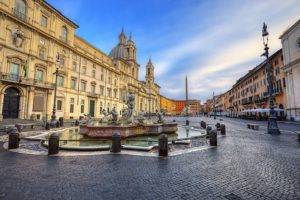 Out-of-the-way gems can still be found in the well-trod city
Out-of-the-way gems can still be found in the well-trod city
Piccola Londra
A few tram stops north of Piazza del Popolo, at the corner of Via del Vignola and Via Flaminia, is the street Via Celentano—though its neighbors never call it that. Instead, it's known as Piccola Londra (Little London), a turn-of-the-century, private road that gives off a Notting Hill-meets-Mary-Poppins vibe. Stop by this stretch to see the colorful, immaculate homes and to marvel at how this haven ever came about.
Quartiere Coppedè

EUR

Like what we're doing? Support us: any amount of donation is appreciated
Villaggio Olimpico

Quadraro

Source: Travel + Leisure
Link to original article
Coronavirus: a new decree signed overnight by the Prime Minister Giuseppe Conte and published in the Official Journal contains more stringent measures to contain the spread of the virus in Lombardy and in 14 other provinces where the number of infections are greater.
A series of other measures are valid throughout the national territory. Compared to the initial draft, which began to circulate yesterday evening, there are 14 provinces and not 11 provinces, in addition to Lombardy, affected by more rigorous measures to contain the infection. These provinces are Modena, Parma, Piacenza, Reggio Emilia, Rimini, Pesaro e Urbino, Alessandria, Asti, Novara, Verbano Cusio Ossola, Vercelli, Padova, Treviso and Venezia. The measures stated in the decree are valid from today, March 8, until April 3.

RED ZONE MEASURES (Article 1 of the decree of 8 March 2020)
It is forbidden to enter and exit
Travel in and out of Lombardy and the 14 provinces stated above is prohibited. One can only move for emergencies or "proven" work needs, which must however be authorized by the prefect. Absolute ban on mobility for those who have been in quarantine.
Schools closed until April 3 - The teaching activity for schools of all levels, universities and academies is suspended until April 3.
Bars and restaurants open from 6 to 18 - The decree states an opening hours allowed for restaurant and bar services, from 6 to 18, provided that a place is able to comply with the "obligation" to ensure the interpersonal safety distance of 1 meter in the premises, with the sanction of suspension of the activity in case of violation. The suspension of exams for a driving license is also ordered.
Closed gyms and swimming pools. Derogation for games behind closed doors
The decree also establishes the closure in Lombardy and in the 14 provinces mentioned above of all gyms, swimming pools, spas and wellness centers. Outdoor sports competitions are allowed only behind closed doors (no fans). Shopping centers will have to be closed but only on the weekend. Other commercial activities, other than catering, may remain open on condition that they are able to guarantee a distance of one meter between customers. Instead, museums, cultural centers and ski resorts are closed. Contests are also suspended.
No weddings or funerals. Cinemas and theaters are closed
Civil and religious ceremonies, including funeral ceremonies, are suspended. All organized events are also suspended, as well as events in public or private places, including those of a cultural, recreational, sporting and religious nature, even if held in closed places but open to the public, such as large events, cinemas, theaters, pubs, schools dance halls, game rooms, betting rooms and bingo halls, discos and similar places.
Holidays
Whenever possible, employers are advised to encourage the use of ordinary leave or holidays by their employees.
VALID MEASURES IN THE REST OF ITALY (Articles 2 and 3 of the decree of 8 March 2020)
Schools are closed until March 15th
The teaching activity for schools of all levels and universities remains suspended until March 15th. Educational trips and school trips are suspended until April 3.
Cinemas, theaters and museums are closed
Throughout the whole national territory, the suspension of cinematographic, theatre events and events and shows of any nature "carried out in every place, both public and private". Opening of museums is suspended. The Municipality of Rome announces that it has ordered the closure of all museums, theatres and all places and institutes of culture.
Closed pubs, discos and bingo
Pubs, dance schools, game rooms, betting rooms and bingo halls, discos and similar clubs are suspended.
Bars and restaurants, gyms and swimming pools are open but with an obligation to keep distance of 1 meter between customers.
The managers of catering businesses can continue to keep the premises open, provided that they guarantee the interpersonal safety distance of at least one meter. Same goes for gyms and swimming pools, which can remain open as long as the visitors are guarantee safety distance from each other.
Limit travel
Among the preventive measures, art. 3 point C reads: "It is recommended to limit, where possible, the movement to strictly necessary cases".
Prohibition of staying in emergency rooms
Patient carers cannot stay in the emergency room waiting. Access of relatives and visitors to hospitals is also limited.
Prohibition of mobility for quarantined individuals
Even in the rest of Italy who is in preventive quarantine or has tested positive for the virus cannot move from home.
No civil and religious ceremonies, including funerals
Weddings and funerals are also suspended throughout the country.
Medical congresses suspension
Conferences, meetings and events involving healthcare personnel are suspended.
Prison visits
The decree provides for people in prisons to carry out the visits not in person but by telephone or video.
Holidays
As in the red zone, same goes for the rest of Italy, whenever possible, employers are advised to encourage the use of ordinary leave or holidays by their employees.
Public transport and sanitation of vehicles
Public transport companies will have to take extraordinary measures to disinfect their vehicles.
Communicate to ASL (national heath care company) if you come from the red zone
Anyone returning to Italy from countries at epidemiological risk must communicate it to the competent ASL office. But also those who have passed through the red zones in the last 14 days (article 5, point 2).
THE SANCTIONS
Failure to comply with the decree is punished according to the article 650 of the Criminal Code, as required by the law of 23 February, i.e. with the arrest of up to 3 months and a fine of up to 206 euros.
Original article in Italian and the PDF of the decree you can read here.

A Guide to Job Hunting for Expats in Italy
Relocating to Italy can be an exciting opportunity, and finding a job is an important part of the process. Here are some steps and recommendations to help you get started: Research the Job Market When considering a career move to Italy or seeking new opportunities within the country, it’s essential to research the job market […]
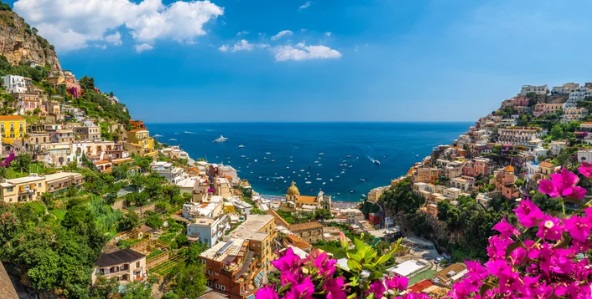
An 8-Day Tour of the Amalfi Coast
Set off on an 8-day adventure across the Amalfi Coast, including excursions to Sorrento, Capri, Pompeii and Herculaneum. Day 1-2: Positano Positano is a visually stunning village on Italy’s Amalfi Coast, characterized by its vibrant cascade of cliffside houses and tranquil beaches. Its labyrinthine streets lead to historical sites such as Grotto La Porta, which […]

10 Benefits of Hiking by Train Around Rome
Guest Article written by Sal from Nature of Sal Embarking on a hiking adventure around Rome by train offers a myriad of benefits beyond mere transportation. From convenience to sustainability, here are ten reasons why exploring Rome’s surrounding hiking trails by train is an enriching experience. Accessibility Train stations are conveniently located throughout Rome (with […]
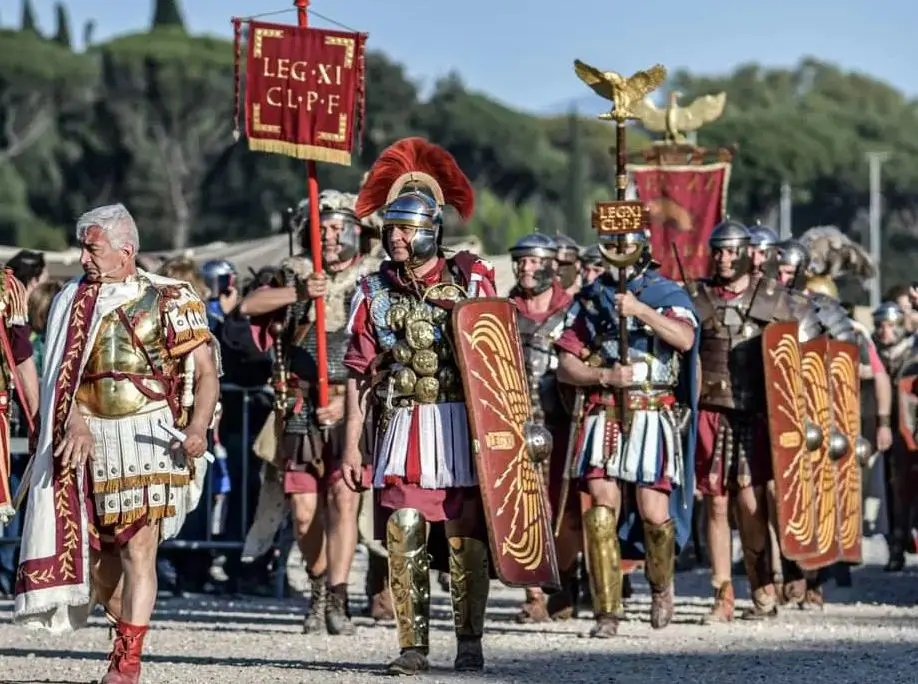
Activities for the 2777th Birthday Celebration of Rome
Birthday of Rome 19-21 April 2024 at Circus Maximus April 18, 2024 – 8:09 PM On the occasion of the 2777th Birthday of Rome, the area of the Circus Maximus hosts the traditional activities of the Roman Historical Group with representations of ancient rites and festivals, gladiator shows, and historical reenactments. Three days of culture, […]
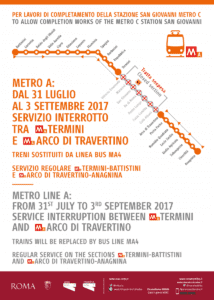 Metro A, will partially clost for work in progress from 31 July to 3 September, Service is interrupted between Temini and Arco di Travertino
Metro A, will partially clost for work in progress from 31 July to 3 September, Service is interrupted between Temini and Arco di Travertino
To allow for completion for San Giovanni station (Metro C), from July 31st to September 3rd service on Metro A is interrupted between the Termini and Arco di Travertino.
The service will continue as normal between Termini and Battistini and between Arco Travertino and Anagnina.
The Termini – Arco Travertino and vice versa are covered by the MA4 bus, which stops near each station.
The 7 stations affected are Vittorio Emanuele, Manzoni, S. Giovanni, Re di Roma, Ponte Lungo, Furio Camillo and Colli Albani direction Arco Travertino.
The MA4 line remains the same time as Metro A: first departure at 5.30, last departure at 23.30 (Sun / Thu) and 1.30 (Fri / Sat)
Link to original article in Italian
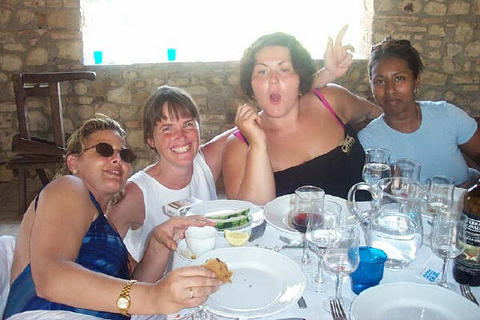
My first Expats’ photo in 2002
I like living in Rome but I don’t think I would like it in any other part of Italy!
I am Patrizia from upstate New York now living in Rome. My parents were both from Caserta, Italy and immigrated to the US when I was only an infant. I was an Expat since I was a year old.
Why Italy?
I guess it was destiny!! My mother always wanted to return to her home country and wasn’t able to do that due to a quick illness and sudden death. Our move back was canceled and we stayed in the US. I always remembered my mom talking about Italy as if it were paradise. I guess in a strange way I am fulfilling her dreams. Doing that I have learnt more about my mother and her culture.
Likes/dislikes about Italy and the Italians?
I like living in Rome but I don’t think I would like it in any other part of Italy. I have traveled and lived in other places but something draws me back here. The beauty of the city, and the nightlife, healthy lifestyle.
Has your life style changed since you moved to Rome? If yes, how?
I have been here so long that I am not sure what my old life style was 16 yrs ago 😉 I eat better and more picky about what I have. I have the convenience of having a car in the driveway or find easy parking. I adapted to things in Rome now. I am less materialistic but picked up a few superficial behaviours as well.
What is the the first thing you do when you go back to your home country?
Visit family of course, then find social networks and make new connections 😉
Does Italy/Rome seem multicultural?
Good question – I can say it is MultiCultural among those that have lived somewhere besides Italy all their lives. Rome has a meetup for foreigners and locals to meet everyday of the week. On some days there are 2 meetups for a Cultural or Language Exchange. So yes Rome is very multicultural.
Do you feel yourself integrated?
I have integrated with life here. I don’t freak out on small things. I don’t have a cappuccino after 11am anymore 😉 I dress not to stand out and put my flip flops in the trash. I sit in the post office for hours and don’t complain about it.
Could you tell us a few words about your group Rome expats?
I moved here in 2000 and in 2001 I started on a forum Expats living in Italy and there weren’t many English Speaking Expats that had access to internet so it was harder than to connect, but it was a small forum and we helped one another with information. In 2007 I started using other social media and suddenly I had a website and over 2 thousand members waiting for a meetup. We used to meet up 2 times a week for years but now it’s just once a week. With the emails coming in and managing such a large group, we have less meetups and more online help. 16 years later we have over 9 thousand members! Have a look at our video here.
Have you ever experienced any cases of discrimination/racism in Italy?
Yes… a few times in public with unpleasant remarks. I just ignore it.
Advice to a new expat in Rome? 😉
I don’t think I would have made here without a good network. I have a big network of Italian and Expat friends. It’s a referral system here in Italy. I see lots of Expats that will come to meet up and make friends with others that are living here a short time. I’d say try to make connections with those that have lived here about a year or even more.


